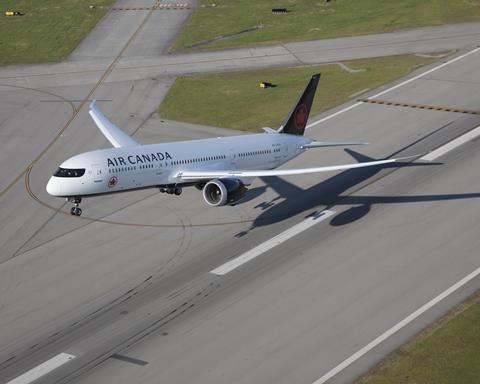Air Canada reports a broad contraction of air traffic in the first quarter, particularly to US vacation hotspots and destinations across the Atlantic Ocean.
The Montreal-headquartered carrier disclosed on 8 May that passenger revenue from its Atlantic segment – encompassing long-haul flights to Europe, India, the Middle East and North Africa – declined nearly 4% year-on-year, to C$939 million ($674 million).
Revenue from flights to the USA, meanwhile, were down nearly 5% compared with the first three months of 2024, and Canadian domestic passenger revenues were roughly flat with the prior-year period.
The results reflect economic turmoil and geopolitical uncertainty associated with US President Donald Trump’s global trade war and persistent threats of annexing Canada. Air Canada also cites greater competition on the Indian subcontinent as impacting transatlantic revenue.
“We anticipate market conditions will remain unsteady with an uncertain economic outlook,” says chief executive Michael Rousseau. “In response, we are prudently moderating our expectations and concentrating on controllable factors such as cost-management and strategic capacity adjustments to ensure strong performance in key financial metrics.”

Air Canada is also reducing expectations for rest of the year. It now expects full-year passenger capacity as measured in available seat kilometres (ASKs) to grow 1-3% year-on-year, rather than the company’s previous estimate of 3-5% ASK growth.
Overall, the airline’s capacity in ASKs decreased 0.4% compared with the first quarter of 2024.
Along with other carriers in the Americas, Air Canada reports that demand for premium travel stayed steady, partially offsetting a decline in main-cabin bookings.
Notably, the carrier’s first-quarter cargo revenues grew year-on-year as ”shippers increased activity to get ahead of tariff deadlines and US changes to the duty-free exemption rules on low-value goods”, it says.
”The first quarter of 2025 was characterised by pronouncements and uncertainty relating to the imposition of US tariffs and related countermeasures,” Air Canada says. ”This, along with a weaker Canadian dollar versus the US dollar, primarily impacted demand for air services on US routes, notably to US leisure destinations.”
Air Canada reports a loss of C$102 million in the first quarter, compared with an C$81 million loss during the same period of last year.
The company’s first-quarter revenue declined about 1% year-on-year, to C$5.2 billion.
Air Canada executives will describe the company’s first-quarter results and rest-of-year outlook in more detail during an earnings call on 9 May.


























